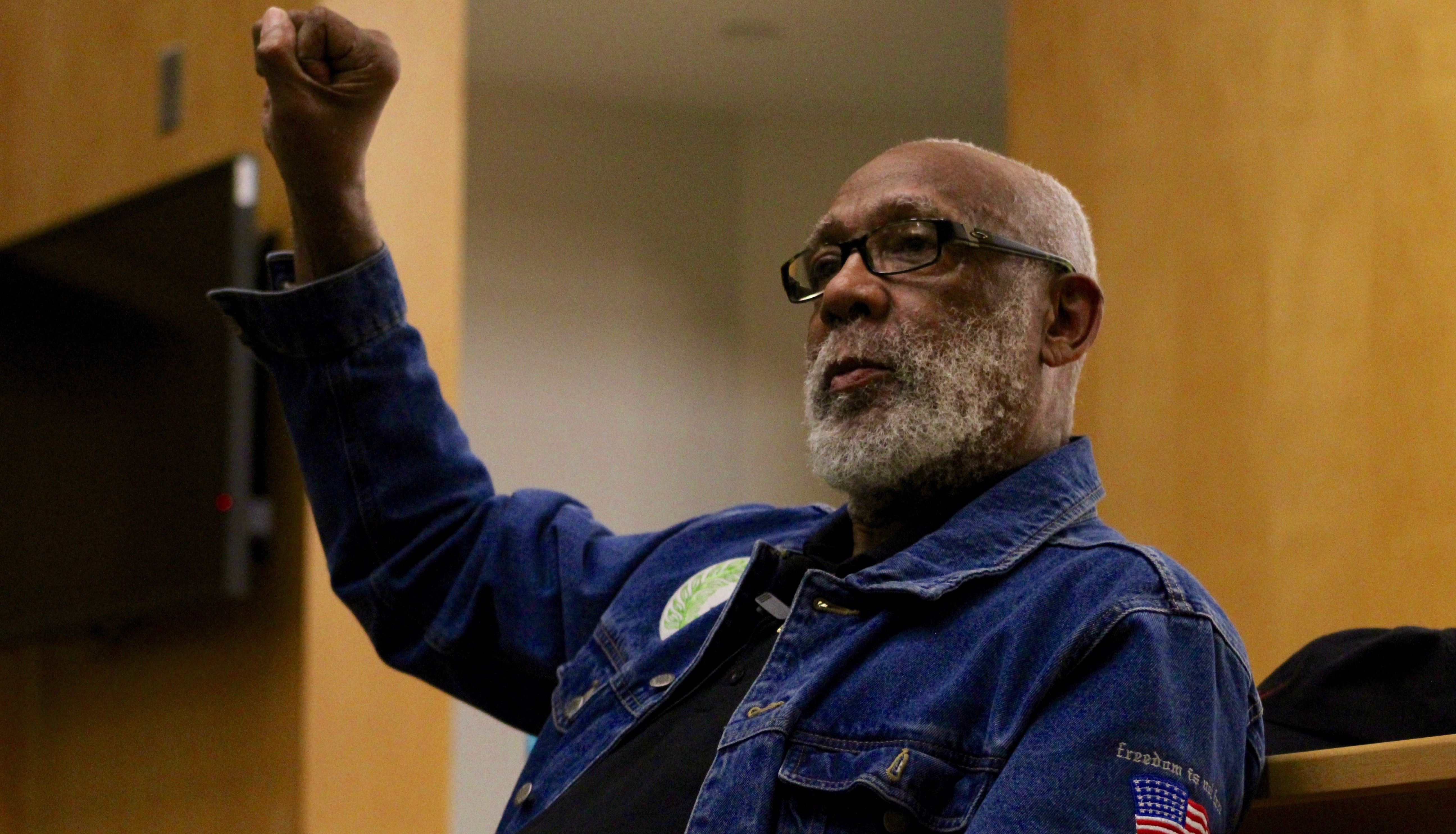Olympic Athlete Dr. John Carlos demonstrates the meaning of the black power fist as a symbol for civil rights during his lecture. Photo by Siobhan Richards
Story by Kate LeBlanc and Jack Meyer.
Civil Rights Advocate and Olympic Medalist John Carlos visited the University of Rhode Island on Wednesday to speak at the second annual race, violence and democracy colloquium.
Carlos became famous at the 1968 Olympic Games after receiving bronze in the 200 meter sprint. He raised the black power fist on the podium during the National Anthem with fellow American Tommie Smith, in an act of racial protest.
“When I went to the games the sun was shining, the birds were singing, the rainbows were out,” Carlos said. “When I left the games, there was no singing, there were no birds, it was lightning and thunder and there weren’t any rainbows. It was chaotic when I got back.”
His actions at the Olympics became the talk of the nation and resulted in Smith and Carlos being dropped from the United States National Team. However, his actions gave him a platform to spread his message about racial inequality for the next 51 years.
“It’s not about me running track,” Carlos said. “It’s about me running to the point where I am building the status to the point where they [are] going to come in and put that microphone in my face.”
Before his speech a dinner was held in the Alumni Room of the Thomas M. Ryan Center. There, Carlos met members of the URI community, including African American student athletes and University faculty.
“Tonight is a continuation of a continued struggle,” Earl Smith III, the assistant dean of the College of Arts and Sciences, said as the introduction for Carlos’s speech. “Given today’s climate, these discussions are as important as ever. As a former student of the University of Rhode Island, I realize how horrific the climate has been and I realize the struggle that many students are facing today.”
Carlos began his speech discussing growing up in New York City. He saw racism present throughout his childhood but never fully understood it. At the colloquium Carlos shared many childhood experiences, including a time a minor fire broke out at his friend’s house and the white firefighters caused excessive, unnecessary damage to their home. He mentioned that whenever he was unaware about racism, his father would point to the skin on his wrist as explanation, leaving him confused.
As Carlos grew older, he said he began to fully understand the racial injustice that existed in America. Throughout his speech, Carlos emphasized that racism still remains a major problem in modern America and anyone can make a change.
“I am the man, I can make a difference,” Carlos said. “You don’t have to be no Olympic champion to make a difference. You don’t have to be a bank teller. You don’t have to be a student. You don’t have to wait until you’re 60 years old. You can make a concrete difference.”
He compared his peaceful protest in 1968 to those of modern day athletes, including former NFL Quarterback Colin Kaepernick kneeling for the National Anthem. He said that people have reacted to Kaepernick’s protest the wrong way, similar to how the public reacted to him after the Olympics.
Carlos admitted he almost stayed home from the Olympics, as he wanted to focus on his family and children. However, his opinion changed when his father advised him to go to Mexico for the games.
“America is the greatest country on the planet in track and field,” Carlos’s father told him. “Somebody from America is going to win in your place and go on the victory stand. The question is whether they’re going to represent you the way you feel you need to be represented.’”
“It became imperative that I made the team,” Carlos said in response.
Members of the URI track and field team helped introduce Carlos at the event.
“Especially as an athlete, I feel as though we can relate to him,” Kristina MacLure, a track team member that helped with the introduction said. “What he stood for, what he stood on the podium for, and his motivating force behind it. I can relate to his journey and his struggle and I know that my team is going to relate to that, too.”
Freshman Leila Cox attended the event as well and asked Carlos a question following the speech.
“To have any minority figure on campus speaking to not just minority students, but in general, speaking about the importance of social justice is just beyond inspiring” Cox said. “And it makes me love myself more than I do right now.”
Carlos’s speech highlighted the importance of diversity in America and how crucial it is to be a leader and speak up.
“I’m not trying to destroy America and I’m damn well not trying to let America destroy me,” Carlos said. “If something is wrong I have to let America know it is wrong. That’s my First Amendment right to say something is wrong. If people tell me based on the color of my skin I shouldn’t be able to say x-y-z, it’s wrong.”





